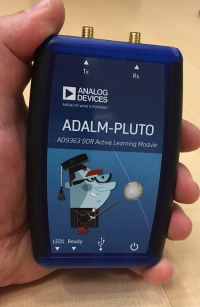More than 32MB RAM (256 MB) available.
Changelog is writable
conf directory is writable
mb_string extension is available and will be used
Valid locale LC_CTYPE=en_US.UTF-8;LC_NUMERIC=C;LC_TIME=C;LC_COLLATE=C;LC_MONETARY=C;LC_MESSAGES=C;LC_PAPER=C;LC_NAME=C;LC_ADDRESS=C;LC_TELEPHONE=C;LC_MEASUREMENT=C;LC_IDENTIFICATION=C found.
Debugging support is disabled
You are currently not logged in
Your current permission for this page is 1
The current page is writable by the webserver
The current page is not writable by you
The search index seems to be working
Server time seems to be okay. Diff: 0s
ADALM-PLUTO for End Users

Everyone using Pluto should read these pages. They will demonstrate how to interact with RF signals with MATLAB, Simulink, GNU Radio or custom C, C++, C#, or Python code on a host (x86) or embedded (Raspberry Pi, Beaglebone, 96boards.org, etc.) platform over USB. As you can see, we have lots of examples with MATLAB and Simulink, as we find that a very powerful environment, and a path to a releasable radio (you can take your algorithms, and easily embed them into a custom product).
Contents
Make sure all things are in ./users
-
-
-
-
-
-
-
-
-
-
-
-
-
Intro to the Software. Installing Device Drivers on:
-
-
-
Upgrading the the ADALM-PLUTO
Firmware .
-
-
Once the driver are configured and set up, you can interact with the
ADALM-PLUTO Active Learning Module from:
-
gqrx, an open source software defined radio receiver (SDR) powered by the
GNU Radio
-
-
-
SDRangel, an Open Source Qt5 / OpenGL 3.0+ SDR and signal analyzer frontend to various hardware.
-
-
-
-
-
-
-
